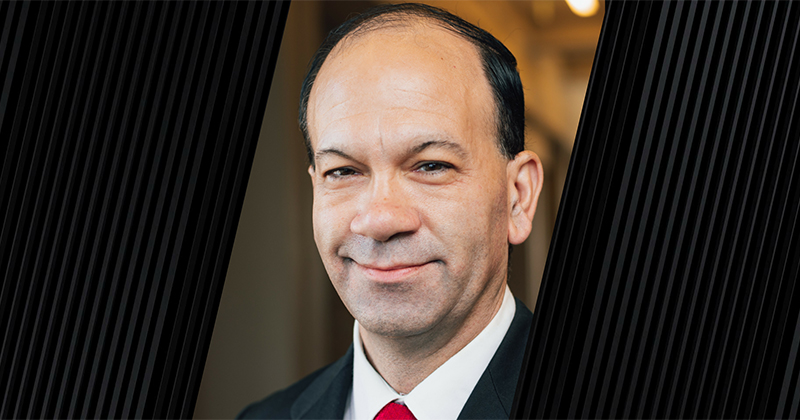HHS Innovation and Entrepreneurship Fellow aims to boost research innovation in the College of Health and Human Sciences
Written By: Rebecca Hoffa, rhoffa@purdue.edu

With four patents under his belt, Joshua Alexander, associate professor in Purdue University’s Department of Speech, Language, and Hearing Sciences, is no stranger to entrepreneurship and innovation. When he was approached about becoming the College of Health and Human Sciences’ (HHS) Innovation and Entrepreneurship Fellow, he was eager to give back to the college through the role, which began on July 1.
An initiative coordinated through the Burton D. Morgan Center for Entrepreneurship, the fellows serve as advocates and liaisons to connect faculty with opportunities to pursue innovation, entrepreneurship and research commercialization in their work and have a lasting societal impact. Beyond this, Alexander also hopes to encourage HHS faculty to foster collaborations with Purdue researchers from a variety of disciplines that could result in the cultivation of new ideas.
“I think that’s where the innovation really can excel,” said Alexander, who is succeeding HHS’ first Innovation and Entrepreneurship Fellow, Sandra Sydnor, in the role. “I don’t see the role as just being a messenger but rather as a motivator to see if we can promote a culture of innovation and entrepreneurship within the college.”
As a researcher, Alexander has been funded by some of the world’s largest hearing aid manufacturers and developed a sophisticated hearing aid simulator that resulted in new knowledge to enhance speech understanding and reduce listening effort for hearing aid users.
“Dr. Alexander already has four patents in his name and is currently working on an NIH SBIR (Small Business Innovation Research) grant supporting an audio processing platform,” said Cammie McBride, HHS associate dean for research. “He has gotten very good grant funding for his work in both an academic and entrepreneurial space, and this combination is exciting as HHS moves forward in research and entrepreneurship. Dr. Alexander has a great understanding of both basic and applied research, and that is what we need to encourage others in the entrepreneurial space.”
As Alexander is currently meeting with other Innovation and Entrepreneurship Fellows across campus and working with HHS leadership to help guide his plans for his new role, he noted that researchers and scientists often don’t set out to create products or start businesses — they simply happen. However, after going through the process multiple times now, Alexander explained that Purdue’s excellent support and resources throughout the research commercialization process make it much less intimidating.
“Purdue really does provide a strong ecosystem for entrepreneurship and technology transfer,” Alexander said. “I think it’s a matter of bringing an awareness that with the resources Purdue brings, it doesn’t have to be an extreme time commitment that takes away from the other things we do every day.”
In addition to fostering collaborations throughout the college looking toward entrepreneurship and innovation, Alexander hopes to help connect HHS faculty to other researchers throughout the university. This comes at an ideal time with the launch of Purdue’s One Health strategic initiative.
“A lot of what we do is problem-focused: We focus on problems related to health, and we focus on problems related to people,” Alexander said. “There are potential solutions out there that we may or may not know about that individuals working in other areas, departments and colleges may have some insights on.”
Beyond his work on the West Lafayette campus, Alexander is also part of a team of researchers who have opened the Accessible Precision Audiology Research Center in the 16 Tech Innovation District near Purdue University in Indianapolis this summer. Alexander noted this offers a great opportunity to enhance research collaborations and focus on innovation surrounding health equity within the urban community.
“The primary purpose of the 16 Tech Innovation District is to serve as an incubator for new ideas and innovations by putting people in the same space who are in very different areas and breaking down siloes,” Alexander said.
The new facility, which includes a semi-permanent sound booth, will also enable SLHS researchers to expand on research and potentially develop new mainstream clinical tests using precision audiology.
“We’re doing an evaluation of hearing that looks at many more elements than are currently done in clinical practice,” Alexander said. “The general idea is to see if we can find connections between test results and subject variables using big data. For example, can the results of these tests give us a more diagnostic indication of the cause of the individual’s hearing loss? Physiologically, there are several different ways one can experience hearing loss, and the solution, which is often a hearing aid, is not a one-size-fits-all solution. Therefore, these outcomes may help audiologists better address individual needs.”
Ultimately, for Alexander, the Innovation and Entrepreneurship Fellows program distinctly positions Purdue to continue to take its research enterprise to new heights, finding ways to translate discovery into solutions that improve lives.
“I think it is a matter of putting people together that could then take what we have at Purdue that’s special and make these teams so much more competitive because we have robust programs in so many areas, and that gives us an advantage over other universities and researchers who are working alone,” Alexander said.
Discover more from News | College of Health and Human Sciences
Subscribe to get the latest posts sent to your email.